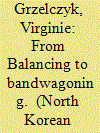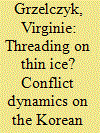|
|
|
Sort Order |
|
|
|
Items / Page
|
|
|
|
|
|
|
| Srl | Item |
| 1 |
ID:
111523


|
|
|
| 2 |
ID:
165777


|
|
|
|
|
| Summary/Abstract |
Article Type: Research Paper Purpose—The DPRK has maintained an extensive array of foreign relationships over the past decades, both for political and economic gains. This article evaluates the impact of the current sanction regime on the DPRK's activities with African countries. Design/Methodology/Approach—The analysis is conducted by using a bespoke behavior framework based on Stephen Walt's "balance of threat" theory. This framework develops the concepts of balancing, defensive bandwagoning, and opportunistic bandwagoning as potential behaviors of African states following the imposition of United Nations Security Council Resolutions to sanction North Korea from 2006 until 2017. Findings—Evidence suggests that some long-standing relationships based on military and economic cooperation have been severed in recent years; thus, it supports a general balancing behavior. Findings also suggest that a specific group of countries subscribe to new opportunistic and defensive bandwagoning by embarking on talks and partnerships in the fields of health and science, regardless of the sanction regime, signaling defiance against a Western-led world order. Practical Implications—Patterns of rapprochements between North and South Korea and between North Korea and the United States have large implications for the potential removal of UNSCRs that paralyze North Korean foreign relations and slow its potential development. A clearer understanding of the DPRK's economic and market networks abroad, as well as potential political allies, can help differentiate between legitimate activities and illegal ones. hence, it allows a more informed approach to engage with the DPRK. Originality/Value—The article looks at the DPRK's relationships with countries that have often been ignored because they were not seen as important, given that North Korea was never expected to be successful in developing advanced military and nuclear technology. It is original as it looks at declassified official documents, official economic and military trade records and news archives, and presents an encompassing analysis of 51 African countries' relationships with the DPRK over time. The results of the study are valuable as they add to the understanding of the DPRK's foreign policy behavior, which is important given its potential nuclear status.
|
|
|
|
|
|
|
|
|
|
|
|
|
|
|
|
| 3 |
ID:
141767


|
|
|
| 4 |
ID:
087305


|
|
|
|
|
| Publication |
2009.
|
| Summary/Abstract |
Over the past decade, multiple attempts have been made to curb North Korea's development of a nuclear program. Major world powers such as the United States and China have reached out to Pyongyang through bilateral and multilateral negotiation processes. The Six-Party Talks, the current negotiation mechanism used to discuss options for a potential denuclearization of the Korean peninsula, have brought back hopes that a deal might one day be reached. What type of framework is provided by the Six-Party Talks? How have parties' negotiation behaviors been influenced by the Talks, and how have they in turn impacted the process? Could this negotiation mechanism eventually become more institutionalized? Although this process has not yet emerged as a successful example of an institution that can influence North Korea's determination to become a nuclear power, it has moved beyond its infancy and should be considered a viable tool within foreign policy options.
|
|
|
|
|
|
|
|
|
|
|
|
|
|
|
|
| 5 |
ID:
163162


|
|
|
|
|
| Summary/Abstract |
In 2018, both the Republic of Korea (ROK) and the Democratic People’s Republic of Korea (DPRK) will mark the 70th anniversary of the establishment of their separate governments. This is a sad reminder that much remains frozen on the Korean Peninsula. For one, families have been separated and communication channels between the two Korean populations are almost non-existent. Yet, stability is precariously established by an Armistice that was signed in 1953 and that was never replaced by a permanent peace mechanism. Moreover, North Korea’s rapid nuclear development has contributed to tensions and uncertainties, and the Six-Party Talks, originally designed to ensure the denuclearisation of the peninsula, has been at a standstill for almost 10 years. The Korean story is thus a prime case to study the dynamics of a frozen conflict and this article contributes to the existing literature and analysis of frozen conflicts by suggesting looking at peaceful and violent thawing, as well as conflict withering. In order to so, the paper focuses on three crucial levels: (1) the micro level, the impact of the Armistice in light of today’s Koreas as opposed to their status and standing at the end of the Korean War in 1953, (2) the meso level with geostrategic concerns concentrated over sectorial policies surrounding the Korean Peninsula in a globalised world, and (3) the macro level with the changing nature of security governance. It is argued that in a catch-22 motion, the thread of violent thawing maintains the conflict in its frozen state.
|
|
|
|
|
|
|
|
|
|
|
|
|
|
|
|
|
|
|
|
|